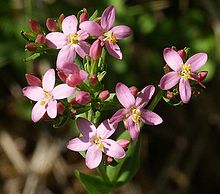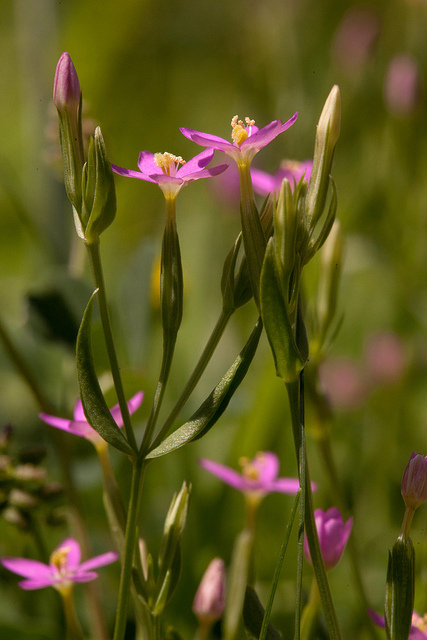Map Snapshot


1 Record
Seasonality Snapshot
Source: Wikipedia
| Centaurium erythraea | |
|---|---|

| |
| Scientific classification | |
| Kingdom: | Plantae |
| Clade: | Tracheophytes |
| Clade: | Angiosperms |
| Clade: | Eudicots |
| Clade: | Asterids |
| Order: | Gentianales |
| Family: | Gentianaceae |
| Genus: | Centaurium |
| Species: | C. erythraea
|
| Binomial name | |
| Centaurium erythraea | |
| Synonyms[1] | |
|
List
| |

Centaurium erythraea is a species of flowering plant in the gentian family known by the common names common centaury and European centaury.
Description
[edit]This is an erect biennial herb which reaches half a meter in height. It grows from a small basal rosette and bolts a leafy, erect stem which may branch. The triangular leaves are arranged oppositely on the stem and the erect inflorescences emerge from the stem and grow parallel to it, sometimes tangling with the foliage. Each inflorescence may contain many flowers. The petite flower is pinkish-lavender and about a centimeter across, flat-faced with yellow anthers. The fruit is a cylindrical capsule.
It flowers from June until September.
Distribution and habitat
[edit]This centaury is a widespread plant of Europe (including Scotland, Sweden and Mediterranean countries[2]) and parts of western Asia and northern Africa. It has also naturalised in parts of North America,[2] New Zealand, and eastern Australia, where it is an introduced species. It grows in fields and roadsides.[3]
Taxonomy
[edit]It is also commonly known as “feverfoullie”, “gentian” or “centaury”.[2]
Uses
[edit]The European centaury is mainly prepared as a tisane for use in traditional medicine.[4][5]
Chemical constituents
[edit]C. erythraea contains phenolic acids, including ferulic and sinapic acids, as well as sterols (as brassicasterol and stigmasterol), secoiridoid and the glycosides, swertiamarin, and sweroside.[2]
Gallery
[edit]-
Centaurium erythraea
-
Flowers
-
Plant
References
[edit]- ^ "Centaurium erythraea Rafn". Plants of the World Online. Board of Trustees of the Royal Botanic Gardens, Kew. 2017. Retrieved 9 December 2020.
- ^ a b c d Kumarasamy, Y.; Nahar, L.; Cox, P. J.; Jaspars, M.; Sarker, S. D. (2003). "Bioactivity of secoiridoid glycosides from Centaurium erythraea". Phytomedicine. 10 (4). urbanfischer.de: 344–347. doi:10.1078/094471103322004857. PMID 12809366. Retrieved 7 November 2014.
- ^ "Centaurium erythraea". ucjeps.berkeley.edu. Retrieved 2024-03-30.
- ^ "Centaury, Herbal medicine: Summary for the Public" (PDF). European Medicines Agency. 2 February 2016.
- ^ El Menyiy, Naoual; Guaouguaou, Fatima-Ezzahrae; El Baaboua, Aicha; et al. (10 August 2021). "Phytochemical properties, biological activities and medicinal use of Centaurium erythraea Rafn". Journal of Ethnopharmacology: 114171. doi:10.1016/j.jep.2021.114171. Retrieved 24 June 2024.



